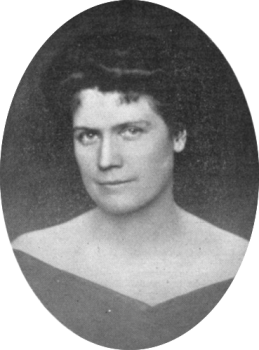
One hundred years ago this week, Grace Kingsley visited the set of the next Mary Pickford film, M’liss. The twenty-five year old star did a good job of reminding fans that she was an adult who only played the part of a child:
“There are such a lot of stunts I always wanted to do when I was a youngster, and mother wouldn’t let me. Now she can’t help herself, when it’s in the cause of art, and whenever I get a new picture, I beg them to put in some of these stunts. I always wanted to ride bareback, and when I was a little kid, and used to visit my aunt in Canada, she let me go out to the ranch and ride to my heart’s content, but as soon as mother came, it was all off. I’m doing some wild bareback riding that I learned in my childish days in Canada, and I’m also getting the sling-shot fever out of my system.
You see when I was little, they always used to let Jack, my brother, have a sling-shot, and we used to play Goliath and David. He wanted awfully to be the giant, but he also wanted to keep the sling-shot, but finally, though torn between the two desires, I got him to let me be David, and we cracked mother’s new mirror and I accidentally killed a bird—I couldn’t have hit it if I had tried—and after that no more sling-shots for me until this picture.”
Her childhood was firmly in the past. This is also much rosier picture than what her life was actually like when she was young. Her father died when she was six and her brother was 18 months old, and she had been an actress to help support her family since she was seven. But that story wouldn’t have helped publicized M’Liss. Pickford knew what the public wanted to hear.
Unfortunately, Kingsley still wrote about her as a child:
M’liss is being rushed through to completion on account of some mysterious mission which Miss Pickford has in the East in connection with Red Cross activities, and which promises to be quite the biggest mission such a little girl ever had to perform.
That ‘little girl’ was embarking on the third Liberty Loan drive and according to her biographer Eileen Whitfield she outsold Chaplin and Fairbanks. Moreover, “a single speech in Pittsbugh was reported to have raised five million dollars.” (p. 180)
M’Liss is available on DVD, and Fritzi Kramer has a modern review of it on Movies Silently. She found it “a curious mix of humor, death and jaw-dropping inappropriateness.”
At the Million Dollar Theater, owner Sid Grauman experimented with a new way to get customers in the door:
Almost the entire cast of Flare Up Sal, a Thomas Ince production starring Dorothy Dalton, has been engaged to appear in a special prologue to the play. This prologue, arranged by Mr. Grauman and rehearsed under his direction by the original company with the big orchestra and organ, will reproduce scenes in the ‘Loo-Loo Bird,’ the notorious dance hall of the old mining camp of Jimtown…Many of the stage settings for these scenes have been obtained from the original sets in the Ince Studios, and the members of the company wear the costumes in which they appeared before the camera.
This was Grauman’s first prologue. He continued to feature them at his theaters because they worked: he stayed in business when so many others didn’t.
Flare Up Sal told the story of a dance hall singer in a California gold rush camp. She falls in love with a bandit disguised as the new town minister. Complications ensue, but after the saloon burns down they leave town, resolving to reform. L.A. Times film critic Antony Anderson commended its “wild midnight rides, escapes, gunfights, fires, adventures that stir the blood and quicken the pulse.” The film survives at the Library of Congress.

Kingsley told a humbling story from Roscoe Arbuckle:
While crossing the continent recently Fatty was enjoying life and everything in the prospect of getting back to his native sunny California. Shortly after leaving New York along came a sour-visaged conductor in his ticket expedition. Fatty extracted one of those lengthy strips of paper which the railroads are pleased to call tickets and handed it to the conductor. As that worthy individual glanced at the name he remarked:
“Oh your name is Arbuckle?”
“Yes,” acknowledged Fatty, trying to appear modest.
“Well, I’ll declare,” said friend conductor, “this is the first time I’ve met up with that Arbuckle coffee name in years.”
Arbuckle concluded, “fame is not all it’s cracked up to be.”
With this little story I stumbled into the history of American coffee. It seems that before the 1860’s when John Arbuckle invented a glaze that allowed roasted coffee to stay fresh, people had to buy green coffee beans and roast them at home. This wasn’t just another chore in the morning: coffee burns easily so people were drinking some horrible stuff. Arbuckle’s Coffee other innovation was selling it in convenient one pound sacks. The company is still in business.







I love Mary Pickford’s performances.
When it comes to her interviews – and this is probably very mean of me – she often sounds so fake. But that doesn’t take away from her talent, or her accomplishments (e.g. United Artists).
LikeLiked by 2 people
I don’t think you’re being mean, I think you’re noticing the way she performed being a celebrity. She was very careful about what she said to the press, and she figured out the rules very early on. Plus, everybody wanted her to be a little girl when she was a responsible businesswoman — that adds a layer of inauthenticity. I don’t think her audience wanted her to be herself.
Gee I’m glad I’m not famous!
LikeLiked by 2 people